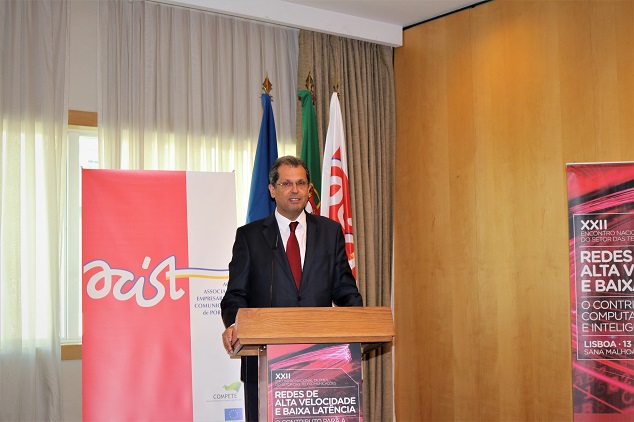
João Cadete de Matos, Chair of ANACOM, at the opening session
The chair of ANACOM, João Cadete de Matos, at the 22nd ACIST conference held on 13 November in Lisbon, highlighted the role of small- and medium-sized enterprises in terms of territorial cohesion, employment, economic growth and the development of the communications sector. At the conference, on the theme "High-speed and low-latency networks", he said that the expansion of high-speed networks throughout the territory, even in the most isolated regions, is a priority.
He pointed out that currently 72% of households in Portugal are connected to high-speed networks, 90% of which use fibre optics, but that this effort has to continue because it is essential to ensure the development of business activities throughout the country; and the well-being of the people. In his opinion there can be no population clusters without access to the Internet, which blocks the access of the new generations to digital development. Access to technology is a key element to prevent depopulation of the country and promote territorial cohesion.
The chair of ANACOM believes that the public authorities, that is, the governments, regional governments, municipalities, parishes and even the European Commission, have a responsibility to ensure that all people benefit from sustainable development, with the emphasis on public investment to bring the fibre networks to the interior of the country.
In this context, the importance of infrastructure sharing is also underscored, so that networks and services can reach all areas, even those with low population density where the return on investment will be more difficult. He emphasized the importance of mobile operators establishing roaming agreements, not just in emergency situations. National roaming is one of the 27 measures identified by the working group led by ANACOM to boost the protection and resilience of networks in the event of fire; it also meets the consensus of the operators, but ANACOM’s chair considers that it is possible to go further and ensure better services to citizens and companies in this way.
Concerns about digital television were addressed, too, and it was mentioned that ANACOM is working with several entities, including ACIST, to make a survey of the situation in the field. The purpose is to make a diagnosis that enables us to find solutions for families without television. It is intended to take advantage of the liberation of the 700 MHz band, where DTT currently operates, to solve problems and let everyone be assured of their right to have free TV.
The importance of ensuring the connection by submarine cable between the mainland, the Azores and Madeira, and between the autonomous regions, since the current system is approaching the end of its useful life, was another issue addressed. The chair of ANACOM also noted that submarine cables can be important in detecting and warning about seismic activity.
Consult:
- ANACOM presentation at the XXII National Meeting of SMEs in the Telecommunications Sector of ACIST https://www.anacom.pt/render.jsp?contentId=1463590




